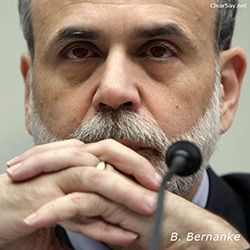|
or: Broken Window Fallacy Simplified by Scotter
A window is broken. Is this a net negative or positive for the economy? Look to your intuition. Does this sound to you like a net negative or positive?

Some (Keynes, Krugman, Bernanke) say: The net effect on the economy is positive. Why/How? "Because the window owner must pay a glazier to fix the window. Obviously, this stimulates the economy." So when you hear it that way, it starts to sound like oh maybe this is a good thing!
Some (Hayek, Schiff, Woods, Rothbard, Mises) disagree. Here is my attempt at simplifying their explanation:
Situation 1: The window is broken.
Situation 2: The window is not broken.
In Situation A: The window owner pays $200. He has a window (like he had before). The glazier gains. Maybe the glazier's employees gain, Etc.
In Situation B: The window owner pays $200. He has a window (that never broke) and the $200 instead went toward a new suit. Instead of the glazier gaining, the suit maker gains. Maybe his employees gain. Etc. In this situation, the suit maker gaining is equivalent to the glazier gaining in Situation A. So what is different? The owner of the window has a window still AND has a new suit.
For those who have a hard time seeing the logic, here is a picture:
The only argument I can see for this that makes some sense is that the owner of the window in Situation A *might* be replacing his window with one that is newer/better. But this begs the questions: (1) How much better, if at all? (2) Isn't it overall typically advantageous for a person to choose themselves when/if they wish to replace or fix an old thing? Would you personally rather have someone make that choice for you by breaking your stuff? Or how about this: If you believe in this idea that destroying wealth is a good way to somehow stimulate greater wealth creation, and when you think about how to begin, do you get a warm fuzzy feeling about your own prosperity and/or that of the surrounding community?
 And: Is this a sustainable thing? In other words, your current economic situation might not be noticeably adversely affected by you choosing to throw away a few pair of shoes and go out and buy new ones to replace them. But what if you scale up? What if you do the same thing with your whole wardrobe, furniture, car, and even house? At what point do you start to realize you are losing way more than the value you are getting back? Yes, when you start talking about insured goods, it gets complicated and even illegal, ha! But the point I'm trying to make here is:
Your intuition is correct! Don't let the politicians and the "economists" who support them convince you otherwise! Destroying wealth is NOT an efficient or sustainable way to create new wealth!
"Those who think that the destruction of war increases total 'demand' forget that demand and supply are merely two sides of the same coin. They are the same thing looked at from different directions. Supply creates demand because at bottom it is demand. The supply of the thing they make is all that people have, in fact, to offer in exchange for the things they want. In this sense the farmers' supply of wheat constitutes their demand for automobiles and other goods. All this is inherent in the modern division of labor and in an exchange economy."
~Economics in One Lesson
If you like this article, please upvote it here:
#paulkrugman #benbernanke #mises #hayek #brokenwindowfallacy
|